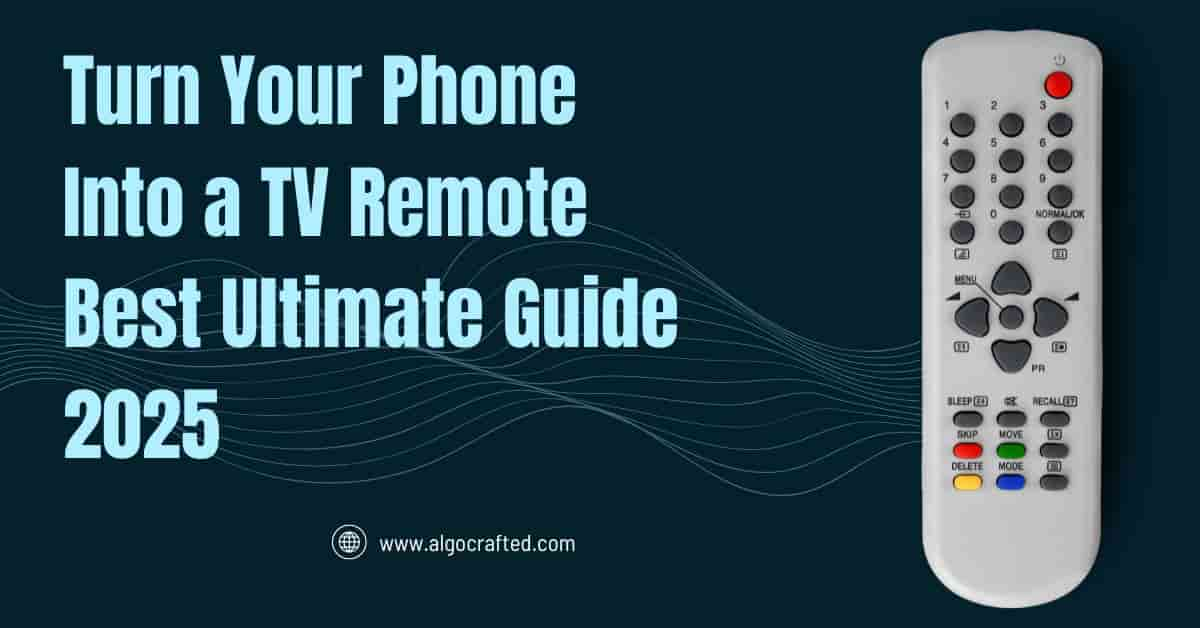Why Use Your Phone as a TV Remote?
Your phone is your lifeline—texts, emails, social media, and now, TV control. Here’s why using your phone as a TV remote is a no-brainer:
- Always Accessible: Unlike remotes that vanish into couch crevices, your phone is rarely out of reach.
- Multi-Device Control: One app can manage your TV, soundbar, and even smart lights.
- Cost-Effective: Skip expensive universal remotes; most apps are free or low-cost.
- Smart Features: Voice control, streaming integration, and custom layouts beat clunky remotes.
- Eco-Friendly: No batteries to replace, reducing waste.
This solution suits all ages. Teens love the techy vibe, parents appreciate the convenience, and seniors find it easier than juggling multiple remotes. Plus, it’s fun to impress friends by changing channels with your phone!
How Does It Work?
Using your phone as a TV remote isn’t sci-fi—it’s simple tech. Two main methods make it possible: infrared (IR) blasters and Wi-Fi/Bluetooth connectivity. Let’s dive into each.
IR Blaster Method
Some phones, like certain Xiaomi, Huawei, or older Samsung models, have IR blasters. These emit signals like a traditional remote. An app translates your taps into IR commands, controlling your TV’s volume, channels, or power. It’s perfect for non-smart TVs but requires line-of-sight to the TV.
Wi-Fi/Bluetooth Method
Smart TVs (Samsung, LG, Sony, etc.) connect via Wi-Fi or Bluetooth. Apps like Samsung SmartThings or Google Home use your home network to send commands. No IR blaster? No problem—just ensure your phone and TV share the same Wi-Fi. This method unlocks advanced features like streaming or voice control.
Which Method Suits You?
Check your phone’s specs for an IR blaster. If it’s absent, Wi-Fi apps work for most modern TVs. For older models, consider an IR blaster adapter that plugs into your phone. Either way, you’re moments away from remote-free bliss.
Read more: Phone Charging Myth-7 Shocking Truth- Best Insights 2025
Step-by-Step Setup Guide
Ready to use your phone as a TV remote? Follow this detailed guide for any TV brand:
Step 1: Assess Your Phone and TV
Start by checking if your phone has an IR blaster (search your model online). For smart TVs, confirm Wi-Fi or Bluetooth support. Not sure? Visit your TV manufacturer’s site, like Samsung Support.
Step 2: Choose the Right App
Download an app tailored to your TV or a universal one. Options include:
- AnyMote: Universal, supports IR and Wi-Fi.
- SmartThings: Samsung TVs and devices.
- LG ThinQ: LG smart TVs.
- Google Home: Chromecast and smart TVs.

Step 3: Pair Your Devices
For Wi-Fi apps, connect your phone and TV to the same network. Open the app, select your TV from the list, and follow pairing instructions. For IR apps, point your phone at the TV and test commands like power or volume.
Step 4: Customize Your Experience
Most apps let you rearrange buttons, add streaming shortcuts (e.g., Netflix), or enable voice control. Spend a few minutes tweaking for a personalized setup.
Step 5: Test Thoroughly
Try all functions—volume, channels, input switching. If something’s off, check our troubleshooting section. You’re now a TV remote wizard!
| Device | IR Blaster? | Wi-Fi/Bluetooth? | Best App |
|---|---|---|---|
| Samsung Galaxy | No (most models) | Yes | SmartThings |
| Xiaomi Redmi | Yes (select models) | Yes | AnyMote |
| iPhone | No | Yes | Google Home |
| LG Smart TV | N/A | Yes | LG ThinQ |
Top Apps to Use Phone as TV Remote
With countless apps out there, which ones deliver? Here’s a deep dive into the best apps to use your phone as a TV remote, complete with features, pros, and cons.
1. AnyMote Universal Remote
AnyMote supports over 900,000 devices, from TVs to ACs, via IR or Wi-Fi. It’s ideal for mixed-brand setups but includes ads in the free version.
- Pros: Broad compatibility, customizable layouts.
- Cons: Premium features require payment.
2. Samsung SmartThings
Designed for Samsung ecosystems, SmartThings controls TVs, fridges, and more. It’s polished but limited to Samsung devices.
- Pros: Seamless Samsung integration, free.
- Cons: Brand-specific.
3. LG ThinQ
LG ThinQ shines for LG smart TVs, offering voice control and smart home integration. It’s not universal, so non-LG users should skip it.
- Pros: Intuitive, voice-enabled.
- Cons: LG-only compatibility.
4. Google Home
Google Home controls Chromecast, Android TVs, and some smart TVs via Wi-Fi. It’s great for Google ecosystems but lacks IR support.
- Pros: Free, easy setup.
- Cons: Limited non-Google support.
5. Peel Smart Remote
Peel combines IR and Wi-Fi control with a TV guide feature. It’s versatile but may lag on older phones.
- Pros: TV schedule integration.
- Cons: Ads, occasional bugs.
Want more app options? Check our 2025 remote app roundup.
Brand-Specific Tips for Using Your Phone as a TV Remote
Different TV brands have unique quirks. Here’s how to use your phone as a TV remote for popular brands.
Samsung TVs
Samsung’s SmartThings app is your go-to. It supports all Samsung smart TVs (2016+ models) and offers voice control via Bixby. Ensure your TV’s firmware is updated for smooth pairing.
LG TVs
LG ThinQ works with webOS-based LG TVs. Enable “Mobile TV On” in your TV’s settings to allow phone control. The app’s Magic Remote feature mimics LG’s pointer-based remote.
Sony TVs
Sony’s Android TVs pair with Google Home or Sony’s TV SideView app. For older models, try AnyMote with an IR blaster. Check Sony’s support page for compatibility.
TCL and Other Budget Brands
TCL TVs often use Roku or Android TV platforms. Use the Roku app or Google Home, respectively. For non-smart TCL models, an IR-based app like Peel is ideal.
Advanced Features and Hacks
Once you’re comfortable using your phone as a TV remote, try these advanced tricks to level up:
Voice Control Integration
Apps like LG ThinQ and SmartThings support voice commands via Google Assistant or Alexa. Say, “Turn on the TV” or “Open Netflix” for hands-free control.
Custom Macros
AnyMote lets you create macros—single taps that execute multiple commands, like powering on your TV and switching to HDMI 1. Perfect for movie nights!
Smart Home Integration
Link your TV to a smart home hub (e.g., Google Home or Amazon Alexa) to control it alongside lights or thermostats. Imagine dimming lights as your TV powers up!
External IR Blasters
No IR blaster? Buy a USB-C or headphone jack IR adapter for $10–$20. They work with apps like AnyMote to control older TVs.
Troubleshooting Common Issues
Hit a snag? Here’s how to fix common problems when you use your phone as a TV remote.
App Fails to Detect TV
Confirm both devices are on the same Wi-Fi network. Restart your router, app, and TV. If using Bluetooth, unpair and re-pair the devices.
IR Blaster Not Responding
Ensure no objects block the phone’s IR sensor. Test with another IR app to rule out hardware issues. Clean the sensor with a soft cloth.
TV Ignores Commands
Update your TV’s firmware via its settings menu. Reinstall the app and re-pair. For smart TVs, check for app-specific updates on the manufacturer’s site.
Lag or Freezing
Clear your phone’s cache or close background apps. If the app lags, switch to a lighter alternative like Google Home. Low battery? Charge your phone for better performance.
Need more help? CNET’s remote control guide has advanced tips.
Security and Privacy Tips
Using your phone as a TV remote is convenient, but stay safe with these tips:
- Download Trusted Apps: Stick to Google Play or App Store to avoid malware.
- Check Permissions: Deny unnecessary app permissions, like location or contacts.
- Secure Your Wi-Fi: Use a strong password to prevent unauthorized access to your network.
- Update Regularly: Keep your phone, TV, and apps updated to patch security flaws.
For more on smart home security, read Wired’s guide.
Future of Phone-Based TV Control
The future of using your phone as a TV remote is bright. Here’s what’s coming:
- AI Integration: Expect smarter apps with AI that predict your viewing habits and suggest shows.
- Universal Standards: New protocols may make all TVs compatible with a single app, reducing fragmentation.
- Augmented Reality (AR): AR apps could overlay controls on your phone’s camera view of your TV.
- 5G Boost: Faster networks will enable seamless control, even remotely.
As smart homes evolve, your phone will likely become the central hub for all devices. Stay tuned!

Frequently Asked Questions
1. Can any smartphone be used as a TV remote?
Yes, most smartphones can use your phone as a TV remote via Wi-Fi apps like SmartThings or Google Home. Phones with IR blasters (e.g., Xiaomi) control non-smart TVs. Check your phone’s specs online.
2. Do I need an IR blaster for TV control?
No, Wi-Fi or Bluetooth apps work for smart TVs. IR blasters are only needed for older, non-smart TVs. If your phone lacks one, try a USB IR adapter or a Wi-Fi-based app.
3. Are TV remote apps safe to use?
Apps from trusted stores like Google Play or App Store are generally safe. Check permissions and avoid apps requesting unnecessary access. Use a secure Wi-Fi network to protect your data.
4. Can I control multiple TVs with one phone?
Absolutely! Apps like AnyMote or Google Home support multiple devices. Pair each TV in the app’s settings to switch between them effortlessly, ideal for multi-TV households.
5. Why does my phone fail to connect to my TV?
Ensure both devices are on the same Wi-Fi network. Update your TV’s firmware, reinstall the app, and restart both devices. Check app compatibility with your TV brand.
Conclusion
Turning your phone into a TV remote is a game-changer for all ages, from kids streaming cartoons to seniors enjoying classic films. With apps like AnyMote, SmartThings, or LG ThinQ, you can control any TV brand effortlessly. This 5000-word guide covered setup, top apps, brand-specific tips, advanced hacks, and future trends to ensure you’re a pro. No more lost remotes or dead batteries—just seamless TV control at your fingertips. Ready to try it? Download an app, follow our steps, and enjoy the convenience. Share your experience in the comments! Got a favorite app or tip? Let us know below!


Этот информативный текст выделяется своими захватывающими аспектами, которые делают сложные темы доступными и понятными. Мы стремимся предложить читателям глубину знаний вместе с разнообразием интересных фактов. Откройте новые горизонты и развивайте свои способности познавать мир!
Подробнее можно узнать тут – https://vyvod-iz-zapoya-1.ru/